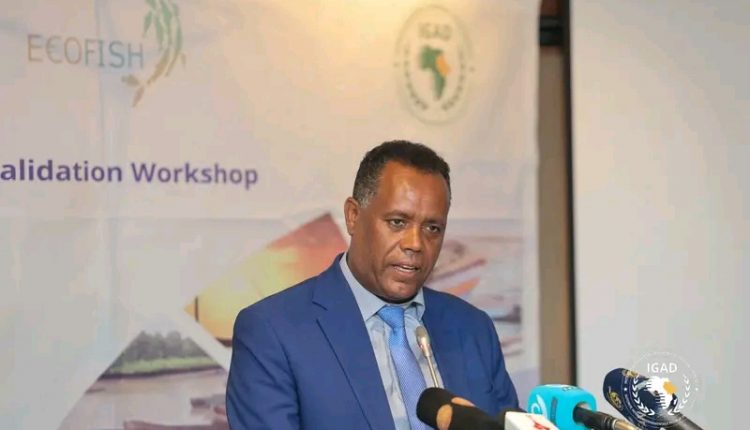Ethiopia reiterates unwavering commitment for IGAD blue economy agenda, fisheries strategy
Addis Ababa, August 12, 2025 (FMC) — Ethiopia has reaffirmed its unwavering commitment to the Intergovernmental Authority on Development’s (IGAD) Blue Economy Agenda, pledging to work with regional partners to strengthen fisheries governance, expand aquaculture, and combat illegal, unreported, and unregulated (IUU) fishing.
Opening a three-day IGAD Regional Fisheries and Blue Economy Consultation Workshop in Addis Ababa, Ethiopia’s State Minister of Agriculture, Dr. Fikru Regassa, said the country is fully aligned with IGAD’s Sustainable Fisheries Strategy (2021–2025) and will continue to support joint initiatives aimed at protecting and developing aquatic resources.
“Our region is blessed with substantial inland and marine fisheries resources that are vital to livelihoods, food systems, and economies,” Dr. Fikru said. “Yet the sector faces challenges including overfishing, fragmented governance, climate impacts, and IUU fishing, all of which threaten sustainability and inclusive growth.”
He pointed to Ethiopia’s 10-year master plan for fisheries and aquaculture, significant gains under the “Yelemat Turufat” (Bounty of Basket) programme, and innovations such as mono-sex male tilapia fry production. Water harvesting programmes and the Grand Ethiopian Renaissance Dam, he added, are creating new opportunities for aquaculture expansion.
Dr. Fikru said the Addis Ababa workshop — which gathers national fisheries authorities, regional organisations, development partners, and civil society — will be instrumental in shaping and validating the proposed IGAD Fisheries Coordination Centre (IFCC) and agreeing on its governance structure. “This is an opportunity not just to share perspectives but to foster enduring collaborations and implement effective, unified strategies for sustainable fisheries,” he said.
The consultation, supported by the EU-funded IOC-ECOFISH Programme, is also addressing the planned establishment of the IGAD Fisheries Forum Agency (IFFA) and the Fisheries Monitoring, Control and Surveillance Coordination Centre (MCS CC). IGAD says these mechanisms will improve regional cooperation, enhance enforcement, and promote sustainable fisheries and aquaculture development.
Daher Elmi, IGAD’s Director of Environment and Agriculture Division, noted that the region has an annual fish production potential of more than 3.5 million tonnes but currently produces about one million tonnes, with over 85 percent from inland waters. “The fisheries sector remains underdeveloped and poorly regulated,” he said, citing weak governance, fragmented policies, and inadequate infrastructure.
Elmi said IGAD is piloting cross-border fisheries co-management systems on Lake Turkana and the Baro-Akobo-Sobat River Basin and working with partners to strengthen intra-regional fish trade and reduce post-harvest losses. He warned that IUU fishing, particularly in Somali waters, continues to deprive local communities of their resources.
The workshop runs until August 14, with recommendations expected to guide the operationalisation of the new fisheries governance bodies and strengthen the sector’s contribution to food security, jobs, and regional integration.

